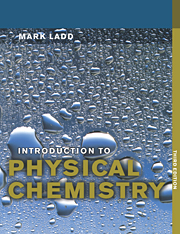Book contents
- Frontmatter
- Contents
- Preface
- Physical constants and other numerical data
- Prefixes to Units
- 1 Structure, energy, mechanism
- 2 Atoms, molecules and their structures
- 3 Determination of structure
- 4 Energy and energetics
- 5 States of matter: gases and liquids
- 6 States of matter: solids
- 7 Phase rule and properties of solutions
- 8 Chemical equilibrium
- 9 Electrochemistry
- 10 Chemical kinetics and mechanisms of chemical reactions
- Appendix 1 Problem-solving with personal computers
- Appendix 2 Stereoviewing
- Appendix 3 Average classical thermal energies
- Appendix 4 Reduced mass
- Appendix 5 Spherical polar coordinates
- Appendix 6 Gamma function
- Appendix 7 Slater's rules
- Appendix 8 Linear least squares and the propagation of errors
- Appendix 9 Determinants and cofactors
- Appendix 10 Solution of a second-order differential equation
- Appendix 11 Separation of variables
- Appendix 12 Overlap integrals
- Appendix 13 Partial derivatives
- Appendix 14 Numerical integration
- Appendix 15 Fermi-Dirac statistics
- Appendix 16 Calculation of Madelung constants
- Appendix 17 The hypsometric formula: an example of the Boltzmann distribution
- Appendix 18 Tables of physical data
- Bibliography
- Answers to numerical problems
- Index
4 - Energy and energetics
Published online by Cambridge University Press: 05 June 2012
- Frontmatter
- Contents
- Preface
- Physical constants and other numerical data
- Prefixes to Units
- 1 Structure, energy, mechanism
- 2 Atoms, molecules and their structures
- 3 Determination of structure
- 4 Energy and energetics
- 5 States of matter: gases and liquids
- 6 States of matter: solids
- 7 Phase rule and properties of solutions
- 8 Chemical equilibrium
- 9 Electrochemistry
- 10 Chemical kinetics and mechanisms of chemical reactions
- Appendix 1 Problem-solving with personal computers
- Appendix 2 Stereoviewing
- Appendix 3 Average classical thermal energies
- Appendix 4 Reduced mass
- Appendix 5 Spherical polar coordinates
- Appendix 6 Gamma function
- Appendix 7 Slater's rules
- Appendix 8 Linear least squares and the propagation of errors
- Appendix 9 Determinants and cofactors
- Appendix 10 Solution of a second-order differential equation
- Appendix 11 Separation of variables
- Appendix 12 Overlap integrals
- Appendix 13 Partial derivatives
- Appendix 14 Numerical integration
- Appendix 15 Fermi-Dirac statistics
- Appendix 16 Calculation of Madelung constants
- Appendix 17 The hypsometric formula: an example of the Boltzmann distribution
- Appendix 18 Tables of physical data
- Bibliography
- Answers to numerical problems
- Index
Summary
Introduction
The study of the energetics of chemical reactions introduces the topics of thermodynamics and thermochemistry. Thermodynamics is a study of matter in bulk that is concerned with energy changes in systems, chemical or mechanical, whereas thermochemistry is the study of heat changes in chemical reactions and is, thus, a branch of thermodynamics. Thermodynamics allows us to predict whether or not a reaction, say A→B, will occur spontaneously, that is, with a decrease in the energy of the system. It does not indicate the speed of the reaction, or even whether it will take place at all without the assistance of heat, irradiation or a catalyst; for this information we shall study reaction kinetics in a later chapter.
General laws of thermodynamics
Thermodynamics rests upon three fundamental principles, the laws of thermodynamics. The laws apply, in the most general sense, to the universe as a whole, and may be given in the following form.
The energy of the universe is constant, whatever processes take place in it.
The entropy of the universe increases, whatever processes take place in it, and must, therefore, tend towards a maximum value.
The absolute scale of temperature has a minimum value, absolute zero, and the entropy of any perfect, crystalline substance is zero at that temperature.
The development of the subject is based on these laws and we shall investigate how they are used in understanding reactions in chemistry.
- Type
- Chapter
- Information
- Introduction to Physical Chemistry , pp. 165 - 198Publisher: Cambridge University PressPrint publication year: 1998



